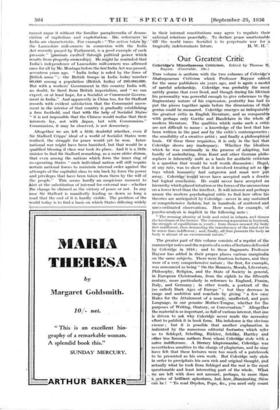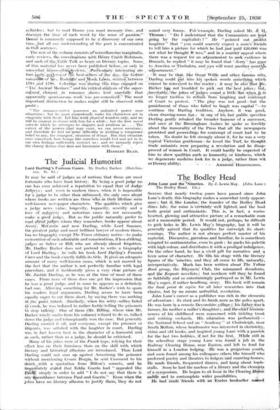, Our Greatest Critte Tins volume is uniform with the
two yelumes of Coleridge's -Shakespearean Criticism which- Professor -Raynor -edited for the same publishers six years ago, and is again a model of careful scholarship. Coleridge.: was _probably the Most
untidy genius that _ever lived, and though-during his lifetia4 his personality was powerful enough to give coherence to tie
fragmentary nature of his expression, posterity has had to put the pieces together again before the dimensions of that genius could be:measured. Coleridge emerges a_ s- indisputably the- greatest critic in English lliterature, and as comparable with perhaps only Goethe and Baudelaire in the whole c0 modern literature. The qualities which make such a critic are not difficult to name : a knowledge of the best that his been written in the past and by the critic's contemporaries ;
the sensibility of a creative artist ; and finally a philosophical basis. Of these three requisites, it is only in the last thiit Coleridge shows any inadequacy. Whether the Idealism :which he was continually in: the process of adapting, but hardly of assimilating, from Kant and other German philo- sophers is inherently unfit as a basis for aesthetic criticism is a question that would be well worth.discussion ; at any rate, was to show that it involved treating art as tie
toys which humanity had outgrown and must now p4t away. Coleridgp7ivoNd Iiiever have accepted such a draStie
but logical concitiSiOn. He could never have accepted an hierarchy which placed intuition or the forces of the unconscious on a lower level than the intellect. It will interest and perhaps amaze the modern psychological critic to find how often his theories are anticipated by Coleridge—never in any sustained
or comprehensive fashion, but in hundreds of scattered and unco-ordinated observations. How much, for example, -of psycho-analysis is implicit in the following note : " The seeming identity of body and mind in infants, and thence the-loveliness of the former. The commencing separation in boyhoOd, the struggle of equilibrium in youth ; from thence onward the body first indifferent, then demanding the translucency of the mind not'to be worse than indifferent ; and, finally, all that presents the body es body is almost of an excremental nature."
The greater part of this volume consists of a reprint of the manuscript notes and the reports of a series of lectures delivered by Coleridge in 1818 ; and to these fragments Profesgor Raysor has added in their proper places various marginalia on the same subjects. There were fourteen lectures, and they were of a very comprehensive nature ; the first, for example, was announced as being " On the Manners, Morals, Literature, Philosophy, Religion, and the State of Society in general, in European Christendom, from the eighth to the fifteenth century, more particularly in reference to England, France, Italy, and Germany ; in other words, a portrait of the (so called) Dark Ages of Europe " ; but they decrease '.in range and ambition' and conclude by giving "a few easy Rules for the Attainment of a manly, unaffected, and pgre Language, in our genuine Mother-Tongue, whether for the purposes of Writing, Oratory, or Conversation." Altogether the material is so important, so full of various interest, that one is driven to ask why Coleridge 'never made the necessary effort to publish it in book form. His indolence is the obvious excuse ; but it is possible that another explanation is indicated by the numerous editorial footnotes which refer us to Schlegel, Schelling, Richter, Schiller, Hartley and other less 'humus authors from whoni Coleridge stole with a naive -indifference. A literary kleptomaniac, Coleridge was nevertheless sensitive to the charge of plagiarism, and he may have felt that these lectures were too much of a patchwork to be presented as his own work. But Coleridge only stole in order to precipitate his own rich and original thought, and actually what he took from Schlegel and the rest is the most questionable and least interesting .part of the whole. What we are left with does not amount, perhaps, to more than a series of brilliant aphOriarn‘ can be I " To read Dryden, Pope, cte., you need only count syllables ; but to read Donne you must measure. time, - and disco Vier--the time of each word by the sense of passicar."- Llothie is commonly supposed to be a--discovery of our own timejaut all our understanding of the poet is concentrated in th sentence:. .
.. .
The rest of the; olume Consists priniseellaneduS-marginalia, early reviews, fite.Convel-satiOns viith-Henry Crabb Robinson, and such ofthe.yable Talk as hears on literary topics. Some of this material has never heen published before, or only in
liff
somewhat hiaCcessib viewg..''''Partictiliirly iritel'esting are.. four arly-szoilem*I of .2.e best-sellers' of the day, the Gothic, ,..... romaift.- .Wof Airs. Radeliffd.andlionk L(Wis, written' between 1794 and 1798. Coleridge was -during this time engaged on . 'critical " The Ancient- Nlariner,4!:and his 'critical analysis orthe super- tikiral eleinent in romance shows hOW carefully that
_. •- .......- apparently spontaneous worltwas pre-conceiveff:' The most important distinction he makes might still be observed with profit :
" The romance-writer possesses an unlimited power over situations ; but he must scrupulously make his characters act in congruity with theffi.: Let him wOrk-phySteal wonders only, and we will be content to dreani with hitnfor a while ; but the first moral miracle which he attempts he disgusts and awakens us . . . The extent of the powers .that may exist, we can never ascertain ; and therefore we feel no'srgr6iit -diffictilfy ifl yielding 1a temporary- belief to any, the strangest, situation of things. But that situation once conceived, how beings like ourselves would feel and act in it, our own feelings sufficiently instruct us ; and we instantly reject the clumsy fiction that does not harmonise. With them." .
HERBERT READ.



















































 Previous page
Previous page